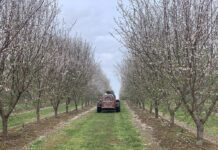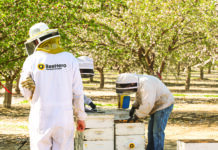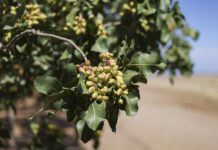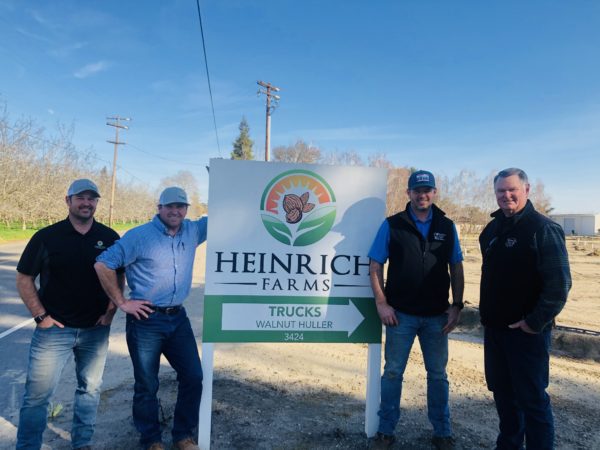
Gordon Heinrich, CEO of Heinrich Farms, oversees 1,300 acres of family farm in Modesto, but his love of farming started at five years old when he was in charge of teaching baby cows how to drink from a bucket. The family business has switched from dairy cows to walnuts and almonds, but Heinrich’s love for the job has only grown as he helps prepare the next generation to take the reins.
Heinrich has seen a lot of changes since those days as a young boy on the dairy farm in the 1950s, including improvements in irrigation practices and increasing mechanization. But he believes the biggest asset in his business is the people, including his three sons who oversee different parts of the operation.
Beyond passing his farming knowledge on to the next generation of his family, Heinrich also supports local FFA and 4H groups to encourage young people interested in farming to take up the challenge.
Heinrich shared his thoughts on the current state of the tree nut industry and where he thinks the industry is headed in the future in an interview for West Coast Nut.
What and where do you farm?
My family and I are still in the Modesto area, farming walnuts, almonds, corn and hay. My wife and I have nine children, seven sons, two daughters, and 21 grandchildren whom I consider a great blessing. Our family is our biggest asset when it comes to our operation. I couldn’t have gotten to where we are today without my family, and my wife, Wendee, has been right there with us working, giving us the support that we all need. She’s the glue that holds our family together.
How have your farming practices evolved in recent years?
Today, we have a lot more resources and tools than what we used to. One of the things that’s progressed is moisture monitoring tools, like the pressure bomb. We believe that water management is crucial in growing quality crops. During irrigation season, we go to each ranch and take pressure bomb readings every three days. We use an app called Pressure Bomb Express to document and chart each reading. This helps us schedule irrigation, which is our scientific approach to farming operation.
What are the three things that keep you up at night related to growing walnuts?
We’re in a market that’s governed by supply and demand, and right now, we have been slightly oversupplied. To overcome this, we must create more demand for our walnuts to get consumption up.
One thing that’s been in our way are retaliatory tariffs; tariffs going into India were at 120%, making it difficult for them to buy our walnuts. Thankfully, they recently removed the 20% retaliatory tariff. Exports are challenged with a strong dollar compared to most other world currencies. Since a majority of the crop is exported, we have had some shipping challenges while trying to get our products overseas in time for the holiday season in Europe and other parts. Some of that has been resolved, but we need to be vigilant and keep our product flowing.
I’m a member of the California Walnut Commission. I had the privilege of serving on the Strategic Plan Task Force for the Board and Commission this past year, in which the final report was recently approved. In this strategic plan, it gives us a new vision and focus for our walnut industry. It addresses building demand, marketing, quality, consumption, communication and much more. Even though the final report is out and available from the California Walnut Board and Commission, I believe it will be a work in progress in our ever-changing industry.
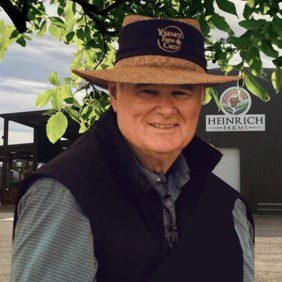
What are you most hopeful for in the future?
Our family farm is in it for the long run, and we have made investments into these crops to produce good and healthy products. We have a tremendously good product. Walnuts have omega-3 ALA fatty acids, and many dieticians put them top of the nut list. Walnuts are also extremely versatile and pair well with other foods like dried figs, raisins and cheese. Personally, I like walnuts on my pancakes.
What in your opinion needs to happen to set the industry in the best possible direction for the future?
We need to create more demand for our products as well as reduce or eliminate the tariffs. By doing that, we’re going to increase consumption.
What do you think the biggest assets are of the nut industry in California?
One of the biggest assets to the nut industry is that we have a region where we can grow quality nuts. We have a perfect climate for growing walnuts with fertile soils and an abundance of water here in the valley.
What is your proudest achievement as it relates to your professional development?
I’m not one to tout my own achievements, and I want to give credit where it’s due. My faith runs deep, and God has blessed me with a great family and a great opportunity to grow great crops.
I’m very proud of all my sons and the fact that our family farm will go into the next generation.
How do you give back to the community both in agriculture and in the community where your operation is based?
Our future generations of farmers are in the young adolescent stages right now. We believe in and support programs that build our future leaders and farmers like Future Farmers of America (FFA) and 4H.
What advice do you have for a young person getting into farming nuts today?
I’d say a young person needs to be diversified in their operation through crops and farm services. There are a lot of ups and downs in the market and in weather patterns, but having a diversified operation helps.
Who was the biggest influence or mentor for you in your career?
My father was the biggest influence. He taught me how to work hard and how to love work. He gave me a lot of responsibility at a young age, teaching me how to be frugal and not live beyond my means. Working side-by-side with him and learning the farming techniques we still practice today is invaluable.
What do you think the biggest advancement has been in the field of nut growing during your career?
I started farming in 1975 at the age of 20. Over the years, innovative mechanization has improved dramatically. Harvest equipment and field equipment have improved, and we can have a much faster harvest capturing quality.
What advancements do you foresee having a big impact in the future?
We will continue to see more automation and precision resources in farming. The future of agriculture is exciting, technology will advance, and the sky is the limit.







